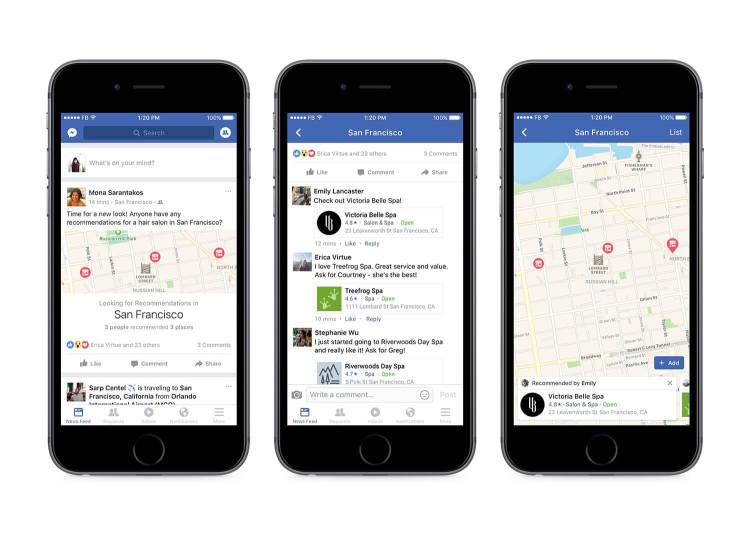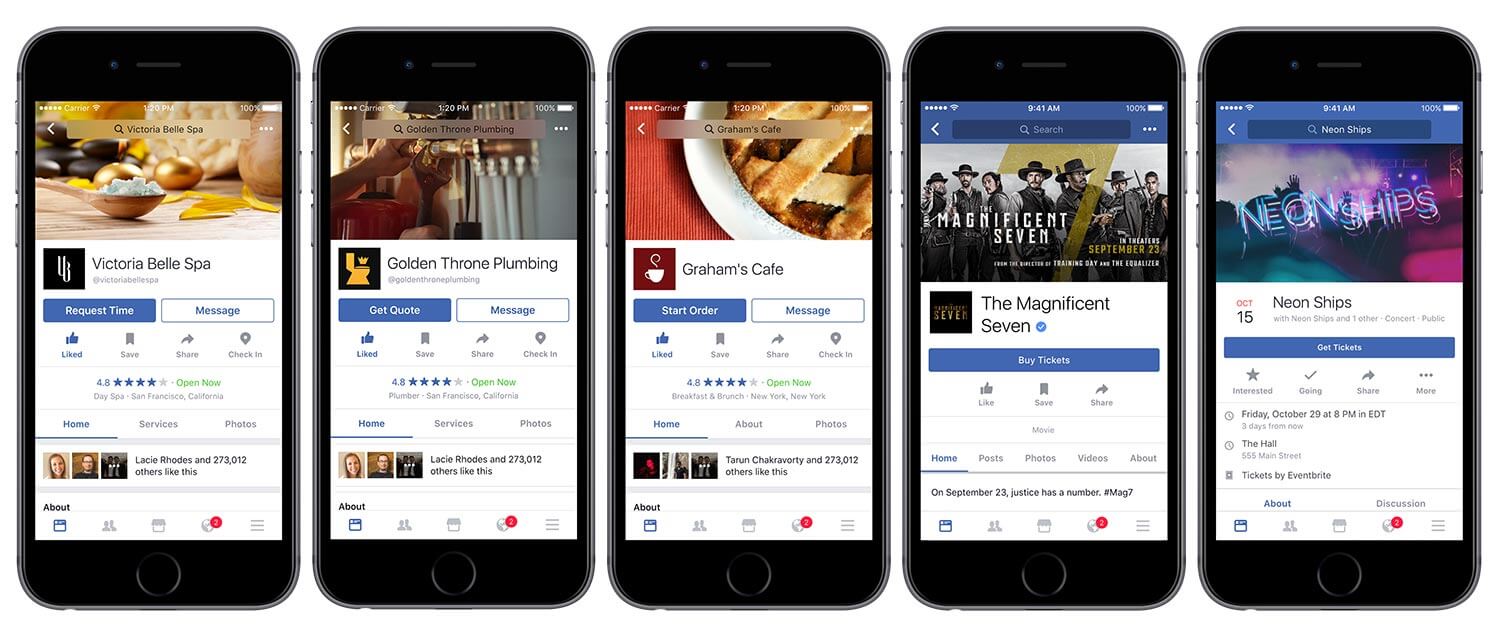Want smarter insights in your inbox? Sign up for our weekly newsletters to get only what matters to enterprise AI, data, and security leaders. Subscribe Now
Facebook has launched new features it believes will make the social network “more useful in your everyday life.” Today, the company added a recommendation tool that helps you discover new places, events, things to do, and services around you by drawing on your friends. If you find an event to attend, Facebook has made the ticket-buying process more seamless. And when it’s time to interact with a business, there are new call-to-action buttons you can use.
Andrew “Bos” Bosworth, Facebook’s vice president of ads and business platform, describes it this way: “It’s Friday night, you don’t have plans, but you have a babysitter, and you’re ready to go. But what do you do? It’s an incredibly challenging process in 2016 to decide what to do, what to actually do, and then you engage in the problem of how to actually do it. We’re worse off now than 10 years ago, when we started to talk about this.”
He explained that people’s current workflow often requires the use of a series of apps to solve this problem of planning and executing activities. “It’s a time-consuming process of navigating what and how to connect with our friends in the real world,” Bos explained.
Locating things to do
With more than 1.65 billion monthly active users, Facebook believes it has the capabilities to solve these problems — from booking a ticket to opening up a line of communication with a business. This process starts with the recommendations feature, which is rolling out to users in the U.S. today. Regardless of whether you’re looking for places to go on your next trip, searching for the best salon around town, or looking for a good Mexican restaurant near you, recommendations from your friends are liable to carry weight.
https://youtu.be/b9s9djBShRI
Getting recommendations is as simple as composing a status update. Facebook will analyze the words that you use to turn on this feature. A post with “I’m looking for restaurants in San Francisco” or “Where can I find night clubs in New York City?” can trigger recommendations. From there, your friends can offer suggestions, and if they recommend any of the 60 million restaurants, businesses, service providers, accommodations, attractions, or venues with a Facebook Page, the system will automatically include the Pages in the comments.
“When someone is responding with a restaurant, when Facebook thinks it recognizes the name, we’ll make a suggestion to people,” Bos said.
Friends can save suggestions by essentially tagging a Facebook Page. Facebook will recognize the “object” and place it on a dynamic map that’ll appear in the post. Every time someone comments with a recognized place, that map will grow. It will also be visible to anyone, based on the author’s privacy setting. These maps are not ephemeral, meaning they’ll stay around until you manually delete them.
But what if a venue, activity, or service provider doesn’t have a Page? Well, you can create a listing for the business.
You can also affix “behaviors” to your status update, such as noting that you’re “looking” for something, but this has no bearing on Facebook’s recommendations algorithm. It’s all triggered by text.
All recommendations you’re given are collected in a dedicated section on Facebook, but, as of right now, you won’t be able to seamlessly “share” them with friends. This means that right now, if a friend also wants to know good things to do in San Francisco, you’ll have to send them a link to view your map (versus a more native option).
Going more native with events
Now that you have recommendations, the next step is to actually execute a course of action. If you’re interested in attending a concert, show, or any ticketed event, Facebook wants to keep you on its platform so your eyes don’t wander over to services such as Yelp, Foursquare, etc. That’s why today the company has revamped its events bookmark to provide a more native flow.
Now when you search for events, you’ll see the latest activity from friends and hosts. You will also be able to browse event recommendations that Facebook provides based on what’s popular with friends or based on events you’ve participated in previously.
One key to eliminating friction in your search process involves closer integrations with partners. With respect to events, Facebook said in July that it was working with Eventbrite and Ticketmaster to help users purchase tickets directly through the social network, eliminating excess steps that could result in abandoned shopping carts. Organizers can incorporate Eventbrite and Ticketmaster into their event listing page, so when people click on the Buy Tickets button, the transaction will be a part of the Facebook experience, and the system will already know your name, email address, and any payment information previously provided. With two taps, you’re done with the checkout process, and a QR code will be provided to grant admission.
Tamara Mendelsohn, Eventbrite’s general manager for consumer products, told VentureBeat that both companies are excited about the early results of this pilot integration. “The results validate our beliefs that providing seamless, in-line purchase experiences helps our event organizers sell more tickets, gives ticket buyers a better experience, and supports a more consistent environment for Facebook users,” she said. “The pilot’s success led us to extend the integration last week from only paid tickets to also allowing registration for free Eventbrite events directly on Facebook. We’re excited to continue partnering with Facebook in new ways to reduce friction for consumers and increase conversion for our organizers.”
While the feature is focused on events, Bos suggested that movie ticket purchase could be another use case, along with other possibilities that Facebook will consider with developers.
It’s not only the Events bookmark on Facebook’s website that will be impacted by this, but also the company’s recently launched events app.
More ways to reach businesses
What if you’re not looking to purchase a ticket, but need something else? Facebook has released new call-to-action buttons that are customized to specific businesses.
New buttons being introduced offer the ability to order food, request an appointment, get a quote, purchase tickets to movies and events, and more. The idea is that if you see a business recommended, click on its Facebook Page, and want to interact with it, you can click or tap on the call-to-action, and then have conversations moved to Facebook Messenger. So if you’re looking to order food, for example, it’s all done through Messenger, thanks to the social network’s integration with Delivery.com. If you want to book an appointment with a contractor, plumber, dentist, chiropractor, or other professional services, there are options. And then there’s the Fandango partnership that facilitates purchases.
Other integration partners include HomeAdvisor, Booker, Slice, Front Desk, BookingBug, Pingup, Schedulicity, Setster, Simplybook.me, Porch, and TalkLocal.
Companies will receive these structured card requests through Facebook Messenger, where they can accept or decline them. Bos believes that this is not a “totally foreign” behavior and added that Facebook will be working with more partners to “make things easier.”
This isn’t the first time Facebook has debuted call-to-action buttons. In fact, the first set emerged in December as part of the company’s strategy to demonstrate why brands need to have a presence on the social network. Other buttons include “book now, “contact us,” “use app,” “play game,” “shop now,” “sign up,” and “watch video,” along with “call now.”
Bos promises that all of these new features are just the beginning and that additional integrations will be made as the company continues working to connect people and businesses with one another.




